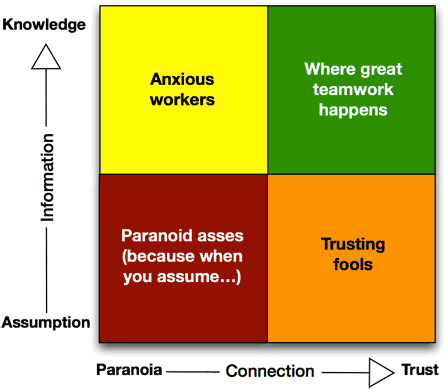Measuring the Cost and Value of Meetings: Part IV – The Gut Check
There’s no one here except us people
Fundamentally, we meet to satisfy our needs for rich information gathering, human connection and to feel a part of a group.
Kevin Hoffman says that meetings “…are the only place we can apply the full range of human communication styles: verbal (spoken word), visual (written words and image), and physical (body language) to a problem as a group.
If we don’t iterate that shared understanding, flawed though it may be, we guarantee misunderstandings, missed deadlines, and feelings of isolation.”
It’s this need for a shared understanding that drives our impulse to meet. You know intuitively whether your meetings create that sense of communal knowledge and purpose for you, or whether they instead frustrate, bore, and confuse.
You can evaluate a meeting’s gut-level value many ways. A simple up/down or like/dislike can suffice. That said, we find it useful and eminently more interesting to take the gut check further, looking at three different aspects of a meeting’s worth using the questions and scales below.
The Pre-Meeting Gut Check: Does it matter?
If this meeting didn’t happen, how much would you care? Put another way: if this meeting were a plant you were growing and it failed, would it be a big deal? Select the answer that best completes this sentence.
IN TERMS OF IMPORTANCE, THIS MEETING IS LIKE A:
- Miniature Potted Cactus
- It’s nice enough and I might water it sometimes. If I remember.
If if fails: Oh well. - Windowsill herb garden
- I like fresh basil, but I know where to buy it if I need to.
If if fails: Chagrin and mild disappointment. - Patio container garden
- I’m really looking forward to some fresh salad greens with dinner.
If it fails: Passing sadness. - Victory garden
- There’s a war on and I need these veggies to supplement our rations.
If it fails: Serious vexation. - Family Farm
- These veggies feed my family and pay the mortgage.
If it fails: Major urgent problems.
Note: if your pre-meeting gut check says that you really wouldn’t give a flying fig if this meeting never happened, perhaps it shouldn’t. Save your time for watering the vegetable garden and let that sad little house plant of a meeting go.
The In-Meeting Gut Check: Are we connecting?
A shroud of mystery surrounds people we can’t see, don’t know well, and don’t speak with often. Depending on your predisposition, you may imbue your mental image of these distant colleagues with either allure or nefarious intent. Either way, this kind of mystique rarely helps teams get work done.
Evaluate your team’s connection during the meeting by plotting the team’s movement along these axes.

A good meeting informs and connects people.
- If you find that your team operates with incomplete information (in the lower quadrants), spend more time preparing for your meetings, distributing information ahead of time, and ensuring that all decisions get clearly documented.
- If you find that your group lacks mutual trust (on the left side of the chart), help them connect through more frequent discussions, interactive brainstorming, and the occasional ice breaker. Equally important, review progress during your meetings by ensuring each person has an opportunity to quickly share what they’ve accomplished and where they’re stuck. Your team will learn to empathize with those who need help and trust those people who deliver.
- If your team operates with high trust and solid knowledge about the work ahead, keep meetings short. You know what to do.
The Post-Meeting Gut Check: Was it good for you?
After the meeting,what do you say when asked, “How did it go?”
Plot your reaction on the good-bad spectrum below.
- Good Meeting
- Rocking
- Amazing
- Productive
- It went well
- Useful
- Fine
- Ok
- Meh
- Waste of time
- Sucked
- Demoralizing
- Really Upsetting
- Bad Meeting
If you frequently leave meetings feeling like they fell below the “Meh” mark, you need to make a change. Unless you must deal with a larger cultural issue, then changing the meeting expectations so that people come prepared and stay focused on making progress will improve the situation remarkably.
In Conclusion
When we work with other people, we need to meet. A meeting is a tool, and when we need to reach agreement, coordinate efforts, and ensure a common understanding between people working together, a meeting is the absolutely best tool we have. Meaningful meetings that help people connect, leave them feeling like a positive part of a group, and that move work forward have enormous value.
Meetings are such an effective tool that many groups meet out of habit more than they meet for a purpose. In these environments, people apply a regular and impromptu meeting hammer to every vaguely nail-shaped problem, beating the snot out of otherwise productive material. That’s an unfortunate situation that can be remedied.
You will need to meet. When you meet, meet well.
If you’ve read this series, you now understand the cost of meetings and how to increase meeting value. Assess your next meeting using some of the measurements we’ve provided, and introduce these concepts to your group. Like any tool, it takes knowledge, skill, and practice to use meetings effectively. With a shared awareness of what makes a meeting worthwhile, your group can start the journey towards mastery.
Related Posts
You may also be interested in the other posts in this series about measuring the cost and value of meetings:



